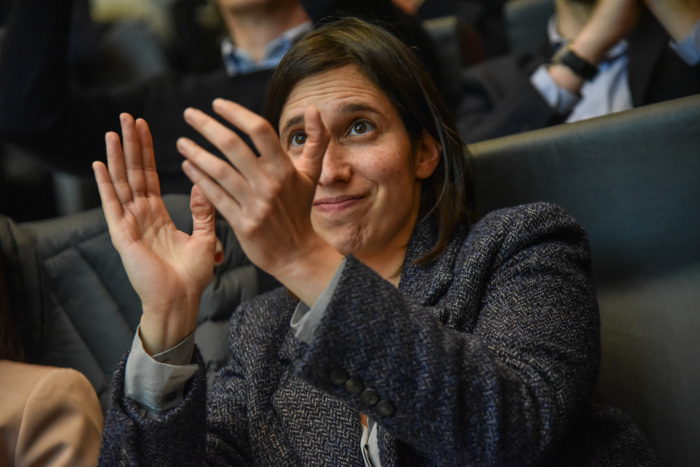The Secretary of State for the Environment, Hugo Morán (59 years old, Campomanes, Asturias), receives EL PAÍS in his office at the Ministry for Ecological Transition a few hours before the Government approved the maritime spatial planning plans on Tuesday — the so-called POEMs—of the Spanish marine demarcations.
These plans open the door to the installation of wind turbines also in the sea, a pending issue in Spain.
And, although it is still in its infancy, platforms for opposition to this type of project have already been established.
This senior socialist official reflects in the interview on the current contrary to the implementation of wind and solar farms that is increasingly resonating with more force in rural areas of the country.
Ask.
Why is it necessary to approve maritime management plans?
Answer.
Until now, the activity that was carried out with marine resources was very limited and historically consolidated.
But new needs and resources have appeared.
Other activities appear that are foreign to the marine ecosystem for human use, such as marine mining or wind energy.
And, of course, they are going to occupy spaces in which other activities have historically moved without these limitations.
In the end, it is a question of organizing the same as has been done historically with terrestrial planning, something that everyone has assumed and internalized.
The marine space was not ordered and Europe has said that it is necessary to order it, and that is what we are doing now.
Q.
Is offshore wind an alternative to onshore wind?
A.
It is a complement.
The entire structure of renewable energy generation is not based on a single technology, because that would probably generate an overcrowding of certain spaces.
We see that there are tensions in the occupation of spaces to replace conventional technologies with these new renewables on land, and there are also tensions at sea, so we must be careful enough to balance the occupation of all those spaces.
Q.
However, platforms have already emerged against hypothetical offshore wind projects.
A.
Yes. There is opposition to photovoltaic parks on land, to wind farms on land and logically it is no different at sea.
It's a similar thing.
Is this something that should lead us to the conclusion that activities cannot be carried out?
No. There has always been opposition to the location of airports, highways, railway lines, sewage treatment plants, waste management stations... Everyone is aware that they need these infrastructures, these equipments and those activities to satisfy their quality of life needs, but nobody likes that they be located in the environment in which they live and which they have historically known in a specific way.
Q.
Not in my backyard, as they say.
A.
Sure.
That phrase of wind power has been coined
, yes, but not like that
.
And I think that what is actually meant is
wind power, yes, but not here, but there
.
But when you go there, the person who lives there tells you exactly the same thing.
We have to be aware that living in a community forces you to be supportive enough to understand that your quality of life has limits beyond which you are contributing quality of life to others in solidarity.
Q.
Perhaps the mistake was made of selling renewables as something that only had positive elements without explaining that there was going to be a change in the landscape?
R.
Probably, because perhaps the whole process started with a comparison in which they tried to highlight the negative aspects of the outgoing conventional technologies, which basically is that they are dirty energies, and what was highlighted about renewables is that they are clean energies.
But in all cases there is an occupation and that means a modification of the landscape and, in broad terms, environmental effects or consequences.
Probably, from the initial simplification this process has been derived from now, when everyone begins to become aware that as conventional technologies are almost disappearing and new technologies are becoming established, it is no longer a question of compare with those who left, but it is about comparing these with themselves.
Furthermore, it coincides in time with something that,
per se
, forces us to make a greater effort of explanation.
Today the citizenry as a whole assumes an environmental awareness of defense of space, understanding that this responds to quality of life, which probably did not exist two or three decades ago, or even ten years ago.
And we have to be consistent with this.
A more demanding society in environmental terms requires more elaborate responses in environmental terms as well.
Q.
Is opposition to renewables growing in the territory?
R.
I believe that what is in the territory is a position of defense of the territory.
If they are renewable, they are renewable, but any other activity that you want to install there will find opposition.
Like a mega-factory of vehicles or the construction of a port or an airport.
The territory defends the territory against anything it considers to be an aggression that will modify what it inherited from its elders.
Wherever a renewable plant appears, because the opposition is to that renewable plant, where the high-speed line appears, that opposition is to the high-speed line.
It is about conserving, preserving what is there as it was.
Q.
Are you worried about how sweet it can be in an election to take the flag against renewables?
A.
That temptation may exist.
And, indeed, when one descends to the realm of the local, he can afford that luxury.
One can have a vision of administrative borders, of a municipal term or, even, of a province, to say
no here
.
But when it comes to the need for planning in terms of the country, you cannot fall for that mistake.
Because a dynamic would be being established in which some territories that oppose this implantation would have the capacity to impose a veto.
And that would mean, in terms of exclusion, imposing the location of these facilities in another territory.
You cannot establish in terms of national planning a mechanism in which you consider that some territories have to have one treatment and other territories a different one.
Hugo Morán in his office at the Ministry for Ecological Transition.
alvaro garcia
Q.
But, if the discourse against renewables is spreading, don't you think that something has not been done well?
Perhaps from the point of view of explaining the advantages that these technologies can have or from the point of view of the implementation model that is being proposed.
R.
In the day-to-day debate that is taking place, there are those who think in one sense and there are those who think in another.
But, in most cases, what actually underlies the motto of wind power yes or photovoltaic yes, but not like that, is wind power yes or photovoltaic yes, but not here.
And of course, the answer that appears on the other side is: And then where?
In order to move forward as a country, we need to be aware that we must all contribute, also as a country.
This is not a debate in which there is a political decision on one side and a social position on the other.
What is it that permanently needs to be explained and in which there has probably been a lack of explanation to the public?
Well, in the perception that exists that environmental requirements are being lightened in relation to the development of this type of project.
That is where the explanation fails or has failed.
The requirement for environmental guarantees in all evaluation processes has not been lightened one millimeter.
Q.
But a royal decree was approved at the end of the year that advocates flexibility in the process for granting environmental authorizations.
R.
That is where I think there has been the failure of explanation.
When they say administrative procedures must be streamlined, they are not saying environmental procedures must be streamlined.
Q.
But if administrative procedures are lightened, citizen participation is reduced, right?
Q.
Not necessarily.
In an environmental evaluation process where the citizen has the opportunity to pronounce himself throughout a project, one always finds himself with the same allegations, regardless of the procedural moment in which this occurs.
To anyone who takes a look at the newspaper library, probably the greatest number of headlines and news that is found is with the complaints that citizens or administrations or developers have because the environmental evaluation procedures are very slow, they are very delayed and In addition, too much documentation is required...
Q.
The system we had until that royal decree was approved has served to give the go-ahead to dozens of macroprojects and thousands and thousands of megawatts of wind power and especially solar power by the central government and the autonomous communities.
Why was it necessary to make the procedure even more flexible?
A.
Simply because we needed to comply with a schedule that, while maintaining the pace of the previous administrative procedure, took us too far in time.
I hear statements from some spokespersons in some territories who, however, have come here to request that environmental procedures be expedited in relation to other types of projects and at the same time raise their voices because they understand that the rhythms should be maintained in relation to the renewables.
I understand the situation.
Probably it is very attractive now in the territory to be at the head of the demonstration.
And in pre-election times even more.
Q.
This also happens within your party.
A.
Yes, yes, in general.
That happens in all territories and it happens with all options.
But that discourse that can be maintained at the local level is incompatible with the obligation that a Government has for planning at the country level, because the Government of a country must have its sights set a little further than in short-term electoral periods.
Is it an exclusive reflection of our country?
It is not.
We have seen what has been the response process that Europe has unleashed at the moment in which it realized that either the procedures are streamlined to achieve a capacity for availability of its own energy resources to separate itself from external dependencies or the consequences that are could drift could be difficult to repair.
Q.
Do you think that energy companies are being responsible in all this debate about the introduction of renewables?
R.
I think that they have substantially modified their portfolio of priorities in their business strategies to the extent that they have been verifying that the action of the Administrations requires them to go in that direction, which is important.
But what I think is more important is that they are encountering an awareness of the public, who are their clients, who are becoming more and more demanding when it comes to verifying their level of corporate social responsibility, also in environmental terms.
And I think they are aware that either they align themselves with this new level of commitment to corporate social responsibility or they are left out of the market.
You can follow CLIMATE AND ENVIRONMENT on
and
, or sign up here to receive
our weekly newsletter
Subscribe to continue reading
Read without limits
Keep reading
I'm already a subscriber









